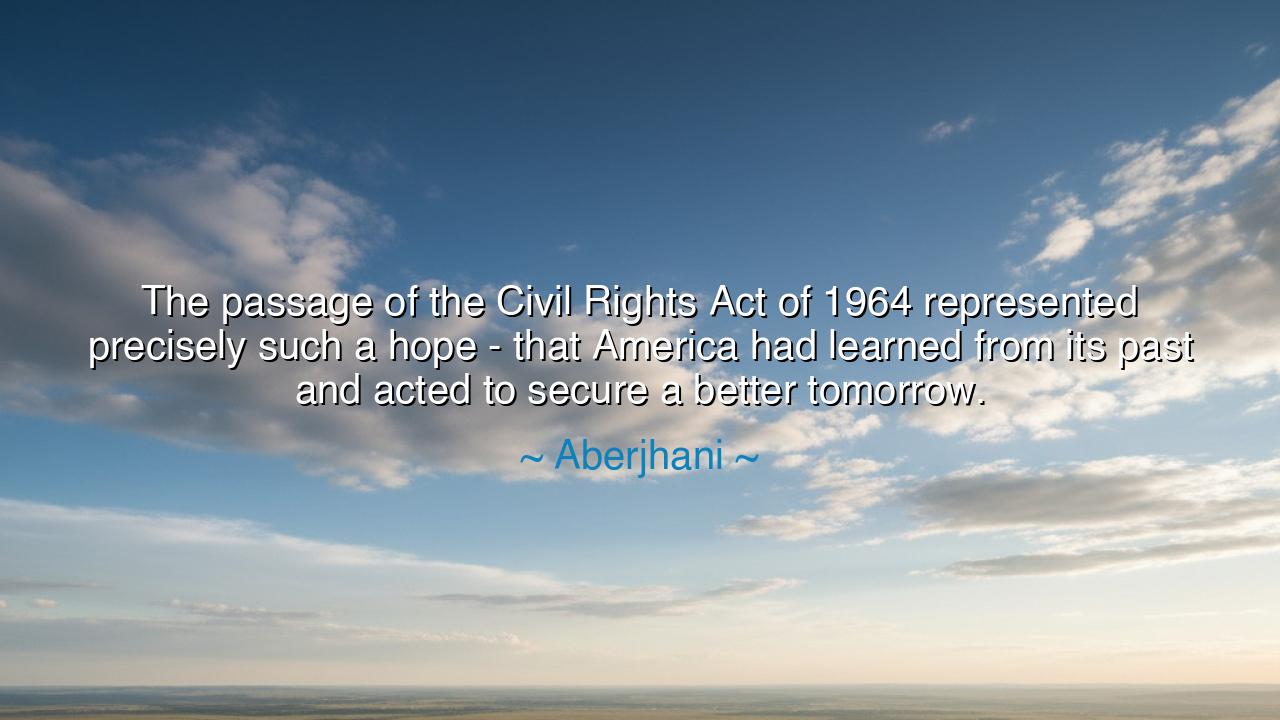
The passage of the Civil Rights Act of 1964 represented precisely
The passage of the Civil Rights Act of 1964 represented precisely such a hope - that America had learned from its past and acted to secure a better tomorrow.






“The passage of the Civil Rights Act of 1964 represented precisely such a hope — that America had learned from its past and acted to secure a better tomorrow.” Thus spoke Aberjhani, the poet, historian, and guardian of memory, whose words bridge the pain of the past with the promise of the future. In this reflection, he captures the sacred turning point of a nation — the moment when, through blood and sacrifice, hope became more than a dream; it became law. His words are not mere remembrance; they are a torch passed down to remind us that history, when redeemed by courage, can become the seed of a brighter dawn.
The Civil Rights Act of 1964 was born from centuries of struggle, from chains and whips, from silent prayers whispered in cotton fields, from marches beneath the sun and from nights haunted by injustice. It was not gifted freely by the powerful; it was demanded by the brave. It arose from the cries of the enslaved, from the songs of the oppressed, and from the blood spilled on Southern soil. When Aberjhani calls it “a hope that America had learned from its past,” he speaks of the moral awakening that comes when a nation, after wandering in the wilderness of prejudice, turns back toward the light of its founding promise — that all men are created equal.
Consider the time in which this Act was born. It was the age of Dr. Martin Luther King Jr., of Rosa Parks, of the students who faced hatred at Little Rock, and the countless unnamed who stood against the tide of cruelty. In Birmingham, they faced dogs and fire hoses; in Selma, they crossed the bridge under the clubs of those who sought to crush their spirit. Yet they did not answer violence with violence, nor hatred with hatred. They marched, sang, prayed, and believed. And when the Act passed in 1964, it was not the triumph of politicians, but the vindication of the human spirit — proof that courage and love, though beaten down, can still shape the destiny of nations.
But Aberjhani’s wisdom lies also in his warning. To say that America “had learned from its past” is to remind us that learning is not a single act, but an unending discipline. The Civil Rights Act was a step — mighty, yes, but not the final one. The same hatred that once wore chains and hoods still lingers in quieter forms: in prejudice unspoken, in inequality unseen, in indifference disguised as peace. Thus, the Act stands not as the end of struggle, but as the beginning of responsibility — a sacred covenant that must be renewed by every generation that inherits its promise.
There is a lesson here for all who live in times of division. A nation, like a soul, must choose between remembrance and denial. To forget the sins of the past is to repeat them; to remember and transform them is to evolve. The hope that Aberjhani speaks of — the hope of a “better tomorrow” — demands not comfort, but action. It calls each of us to be guardians of justice in our own time: to speak when silence is convenient, to stand when others bow, to extend compassion where bitterness might seem easier.
The story of the Civil Rights Act teaches that moral progress is never born in ease. It is carved out of the hard rock of resistance, shaped by those who dare to see beyond their own wounds toward the healing of others. Hope, then, is not naïve belief, but defiant endurance — the refusal to surrender the vision of what humanity might yet become. Aberjhani’s words echo like a prophet’s reminder: that to build a better tomorrow, we must not only act, but remember why we act.
Therefore, my child, take this teaching into your heart: the past is not a burden to be forgotten, but a teacher to be honored. Let the stories of those who walked before you — the marchers, the dreamers, the fallen — become the wind at your back. When injustice rises, stand as they stood. When hope fades, remember that it was hope, and nothing less, that once changed a nation. For as Aberjhani reminds us, a people who learn from their past do not merely survive history — they redeem it, and through their courage, they secure the promise of a better world yet to come.






AAdministratorAdministrator
Welcome, honored guests. Please leave a comment, we will respond soon